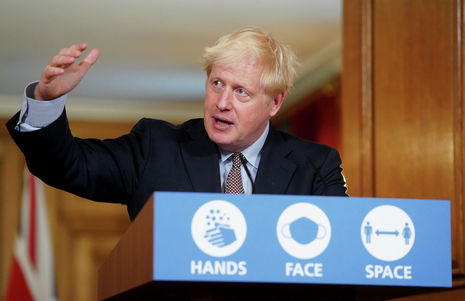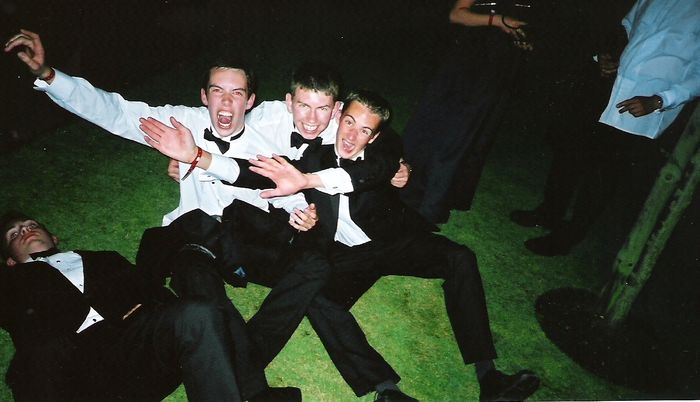The government has privatised the pandemic
Columnist Maia Livne argues that by making Covid restrictions a question of personal responsibility, the government has created an ethical nightmare

No more Covid? Boris Johnson probably never felt more like a stout, dishevelled Santa than when he gave the nation a long-awaited gift this Monday: the ‘end’ of the pandemic. Yet no gift comes without a price, and while the end of Covid isolation may seem, especially for young people, a dream come true, we might just be standing on the threshold of a new social nightmare - the ethical minefield of post-Covid. For, unfortunately - as a recent second stripe on your LFT might have reminded you - Covid has not disappeared. It has changed, yes, and maybe the government’s decisions are even scientifically justifiable - that is, like everything with Covid, up for debate. The difference is that previously, that debate was not let completely loose in the hands of the public. For good and for bad, people had guidelines to follow, and could blame the government for the restrictions or lack thereof. Now, we are all left alone to deal with one of our generation’s most hated topics - solidarity.
“It is easy to brush it off and say people died with and not from Covid, until someone close to you could have lived without it”
Today’s world might just be the most polarised time ever for solidarity and empathy, especially for young people. This is the age of the lonely masses: social media connects people and closes them up in their rooms; phones fly us overseas, only to bash us against an echo-chamber’s walls. Our economic system breeds vicious self-promotion that seeps into every element of our lives - from meditation apps telling us to put ourselves first, to the adoration of the girlboss and the con-artist. This is the cultural heyday of the lone wolf, yet its consequences are universal. Our economy is ruining our planet for the sake of a fraction of the population. The counter-reaction, climate activism, lacking political power, turns personal. And so people go vegan, reduce their waste to zero, and give up planes, straws, and cars, hoping to change, by private actions, the fate of the whole world. In an age of never-ending selfish greed and appetite, the counter-response seems to have been found for many in self-deprivation.
What climate has done to our consumerist gluttony, Covid seems to have done to social interaction. But while consumerism is inherently harmful, in-person relationships are essential for humanity. Covid has destroyed taste buds and social lives alike, ruined people’s mental health, increased domestic violence, and furthered the world’s ongoing sex drought. Yet more than that - unlike the climate crisis - it created an impossible moral equation. The unfortunate thing with bad things happening is that they are - what do you call it? - bad. People who kept social distancing to perfection suffered mentally, people who broke social distancing truly risked and even damaged other people’s health. People suffered economic and social losses from the restrictions, and people died and were ill when restrictions failed to protect them. It is easy to brush it off and say people died with and not from Covid, until it is someone close to you who could have lived without it. It is easy to say people should not prioritise a coffee over other people’s health - but it is harder when all of those omitted social interactions amount to two years of gaping loneliness.
“Now we are all responsible for constructing our own Covid response system”
In this new anxiety-raising and morally-challenging environment, we all saw selfishness from loved ones that we would have rather not been exposed to. At least at first, Covid demanded sacrifice. That seemed as impossible as giving up fast fashion, food, and cars must have seemed to previous generations. After our generation blamed previous ones for risking our lives and destroying our planet, now we have to completely restrict our lifestyle in order to protect those same elders. And though the consequences of selfishness were less apocalyptic, they were far more personal and immediate. Of course, the best socially-distanced interaction was to hate together on the selfishness and hypocrisy of celebrities and politicians who broke restrictions. It was harder to see people we love and respect lie to their parents about partying, refuse to put a mask on, or not get vaccinated. In a time where benevolence became for many exhausting, Covid did not only unveil selfishness, it created it.
As for the current situation, the fact that we all wish to live alongside Covid does not mean, necessarily, that Covid wants us to live. Of course, Omicron, especially alongside vaccines, does not carry the health threat that Covid did previously. Even if we were to name it influenza - “Covid” still echoes for many with the inconsolable deaths of loved ones and the collective trauma of the past two years. This may be the start of a good process, but it will surely be morally messy; this messiness will probably be brought home to students at the end of term, when our minds will have to switch from a Covid-less world to a world where our choices are the only protection for our elderly family members.
Yes, it might truly be the time to call it a day on Covid measures - but it is a mistake to think Covid has been cancelled; it has just been privatised. Now we are all responsible for constructing our own Covid response system, and it will probably be hard, frustrating, and almost impossible to do it in coordination with our families and friends. Now, people will more than ever have to decide how they treat Covid, and what boundaries they set between themselves and others. Responsibility, and some people’s fear for their health, will demand a social price. Social solidarity will come with a price tag as free testing will soon no longer be supplied. The medical consequences will unfold in the following weeks, but what is certain is that guilt, shame, and selfishness will find their way even more into our everyday interactions.
 News / Cambridge academics stand out in King’s 2026 Honours List2 January 2026
News / Cambridge academics stand out in King’s 2026 Honours List2 January 2026 Interviews / You don’t need to peak at Cambridge, says Robin Harding31 December 2025
Interviews / You don’t need to peak at Cambridge, says Robin Harding31 December 2025 Comment / What happened to men at Cambridge?31 December 2025
Comment / What happened to men at Cambridge?31 December 2025 Features / “It’s a momentary expression of rage”: reforming democracy from Cambridge4 January 2026
Features / “It’s a momentary expression of rage”: reforming democracy from Cambridge4 January 2026 News / Varsity’s biggest stories of 202531 December 2025
News / Varsity’s biggest stories of 202531 December 2025










